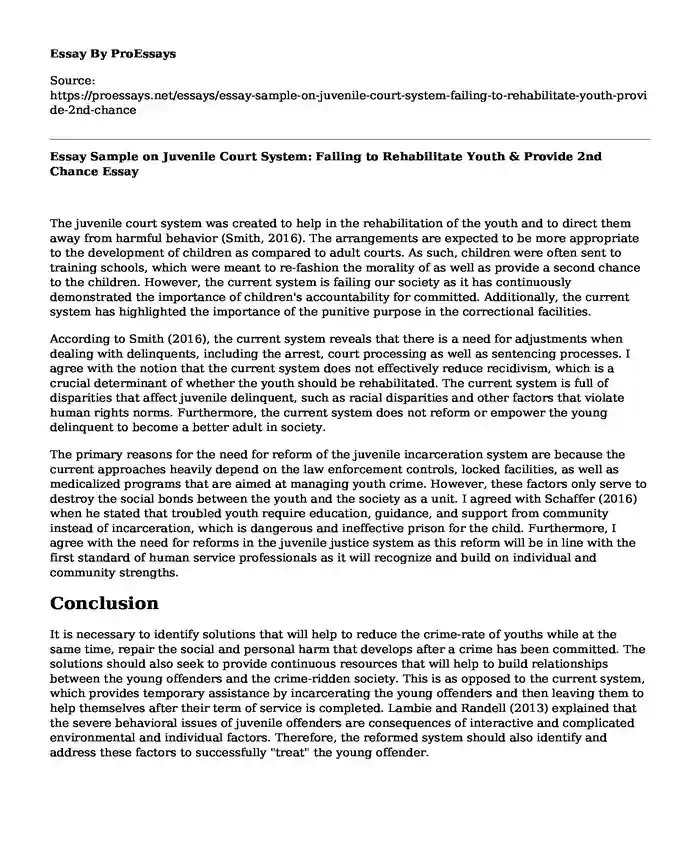The juvenile court system was created to help in the rehabilitation of the youth and to direct them away from harmful behavior (Smith, 2016). The arrangements are expected to be more appropriate to the development of children as compared to adult courts. As such, children were often sent to training schools, which were meant to re-fashion the morality of as well as provide a second chance to the children. However, the current system is failing our society as it has continuously demonstrated the importance of children's accountability for committed. Additionally, the current system has highlighted the importance of the punitive purpose in the correctional facilities.
According to Smith (2016), the current system reveals that there is a need for adjustments when dealing with delinquents, including the arrest, court processing as well as sentencing processes. I agree with the notion that the current system does not effectively reduce recidivism, which is a crucial determinant of whether the youth should be rehabilitated. The current system is full of disparities that affect juvenile delinquent, such as racial disparities and other factors that violate human rights norms. Furthermore, the current system does not reform or empower the young delinquent to become a better adult in society.
The primary reasons for the need for reform of the juvenile incarceration system are because the current approaches heavily depend on the law enforcement controls, locked facilities, as well as medicalized programs that are aimed at managing youth crime. However, these factors only serve to destroy the social bonds between the youth and the society as a unit. I agreed with Schaffer (2016) when he stated that troubled youth require education, guidance, and support from community instead of incarceration, which is dangerous and ineffective prison for the child. Furthermore, I agree with the need for reforms in the juvenile justice system as this reform will be in line with the first standard of human service professionals as it will recognize and build on individual and community strengths.
Conclusion
It is necessary to identify solutions that will help to reduce the crime-rate of youths while at the same time, repair the social and personal harm that develops after a crime has been committed. The solutions should also seek to provide continuous resources that will help to build relationships between the young offenders and the crime-ridden society. This is as opposed to the current system, which provides temporary assistance by incarcerating the young offenders and then leaving them to help themselves after their term of service is completed. Lambie and Randell (2013) explained that the severe behavioral issues of juvenile offenders are consequences of interactive and complicated environmental and individual factors. Therefore, the reformed system should also identify and address these factors to successfully "treat" the young offender.
References
Lambie, I., & Randell, I. (2013). The impact of incarceration on juvenile offenders. Clinical Psychology Review, 33(3), 448-459. https://doi.org/10.1016/j.cpr.2013.01.007
Schaffer, A. (2016, October 21). Youth justice study finds prison counterproductive. Harvard Gazette. https://news.harvard.edu/gazette/story/2016/10/youth-justice-study-finds-prison-counterproductive/
Smith, C. (2013). Nothing About Us Without Us! The Failure of the Modern Juvenile Justice System and a Call for Community-Based Justice. Journal of Applied Research on Children: Informing Policy for Children at Risk, 4(1). https://files.eric.ed.gov/fulltext/EJ1188923.pdf
Cite this page
Essay Sample on Juvenile Court System: Failing to Rehabilitate Youth & Provide 2nd Chance. (2023, Sep 17). Retrieved from https://proessays.net/essays/essay-sample-on-juvenile-court-system-failing-to-rehabilitate-youth-provide-2nd-chance
If you are the original author of this essay and no longer wish to have it published on the ProEssays website, please click below to request its removal:
- Essay Sample on Punishment and Society
- Essay Example on Technological Advancement: Rise of Hacktivism and Cybercrime
- Essay Example on Romantic Intimacy: Dreams, Hopes, and Expectations
- Reconciliation by Polly Clark Essay
- Essay Example on Gender Roles: Perception & Media Impacts
- Cybercrime: Autonomy, Automation & Physical Agency - Essay Sample
- Research Paper Example on Feminist Theory: Understanding Social Justice and Equality







